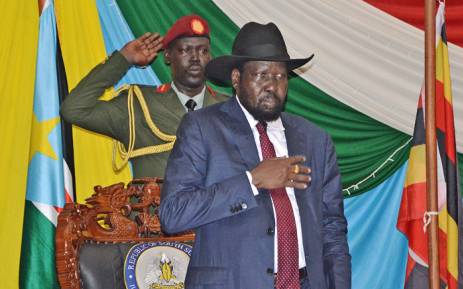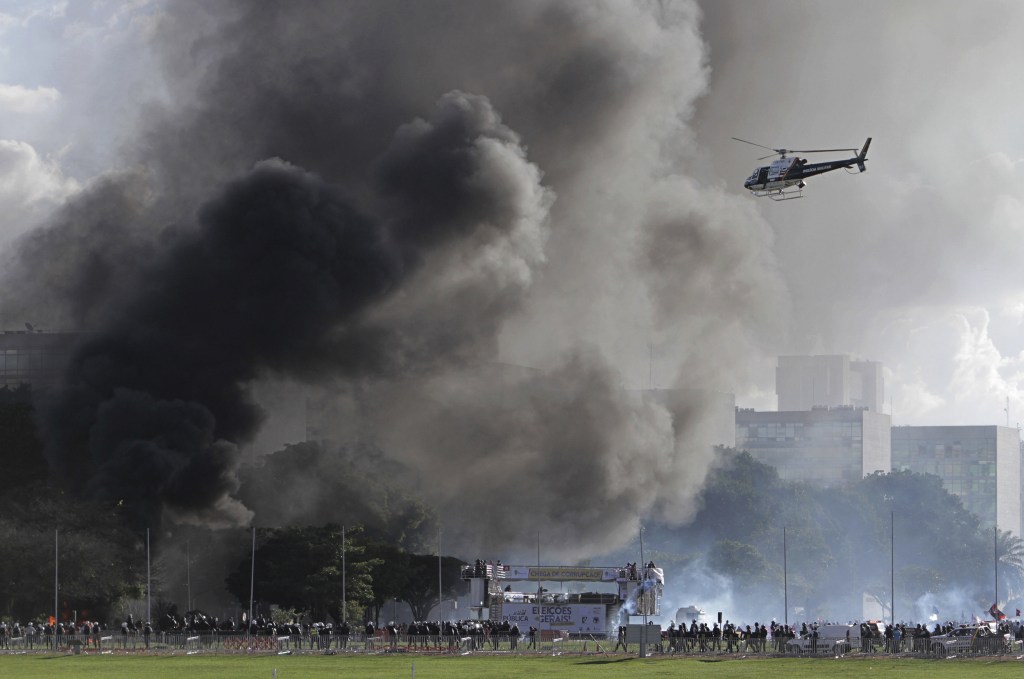|
||||||||||||||||||||||||||||||||||||||
|
||||||||||||||||||||||||||||||||||||||
|
||||||||||||||||||||||||||||||||||||||
|
African Leaders Encourage South Sudan to Revive Peace
By: Sarah Lafen
Impunity Watch News Reporter, Africa Desk
JUBA, South Sudan — The Intergovernmental Authority on Development (IGAD) concluded its summit meeting this past Monday with a focus on the worsening war situation in South Sudan. The bloc at the summit called upon all parties involved to take necessary steps to follow a concrete plan to revitalize the Agreement on the Resolution of Conflict on South Sudan, which was implemented in 2015.

The IGAD also called for a forum including all parties, even estranged groups, to discuss measures to restore a permanent ceasefire. The forum would also develop a more realistic timeline towards South Sudan’s August 2018 elections, and would delay the elections if necessary to a more feasible date. South Sudan First Vice President Taban Deng Gai believes the elections should go forth as planned, however summit delegates officially decided that it would be “too premature” to hold an election considering the country’s high level of violence.
The Joint Monitoring and Evaluation Committee (JMEC) in South Sudan has also decried its country’s continuing violence. JMEC chairperson Festus Mogae commented that “[t]he rapidly deteriorating political, security, humanitarian and economic situation in the country has caused unprecedented displacement, famine, and growing civilian flight. The pace of the implementation of the Peace Agreement has been too slow…”
According to the UN OCHA Humanitarian Bulletin Report distributed on May 28, 3.7 million South Sudanese are homeless. Some have relocated to civilian sites, and others have been moved to refugee settlements in neighboring countries Kenya and Uganda. Also according to the report, 5.5 million people are “food insecure,” and there are many reports of human rights violations including murders, sexual violence, arbitrary arrests, and detentions.
South Sudan President Salva Kiir did not attend the summit due to “pressing issues in the country,” however First Vice President Gai attended in his place.
Sudan’s ambassador to Ethiopia, Jamal Al Sheikh, told reporters that the summit commenced the opening of “Sudanese humanitarian corridors to forward to relief to the affected civilians in South Sudan.” Al Sheikh confirmed that IGAD would continue its efforts to cooperate with willing partners.
For more information, please see:
Africa News — IGAD Redirects South Sudanese Warring Parties Back to Peace Agreement — 13 June 2017
Eyewitness News — Africa Leaders Push South Sudan to Revive Peace, Delay Vote — 13 June 2017
The Star — End Hostilities, Abuse of Human Rights in South Sudan, JMEC tells IGAD — 13 June 2017
Theresa May suggests altering human rights laws to fight terrorism
By: Sara Adams
Impunity Watch Reporter, Europe

LONDON, United Kingdom – On June 5, a van ran onto the sidewalk of London Bridge and swerved back to hit a crowd of pedestrians. Amid the chaos, the attackers exited their van and proceeded to continue their attack on bystanders with knives and fake bomb belts. At least seven people were killed.
The United Kingdom is still reeling from the Manchester bombing on May 22. The bridge attack was quickly found to be terrorism related to the Islamic State.
In response, Prime Minister Theresa May suggested that the UK will change their human rights laws in order to prevent more terror attacks in the country.
These changes, she said, may include longer prison terms for convicted terrorists and simplified deportation methods for “foreign terror suspects.” It has also been speculated that the United Kingdom may seek to opt-out of the European Convention on Human Rights (ECHR).
The ECHR began in 1953 after the European Convention in Rome in 1950. Article 15 of the treaty would allow the UK to disregard certain aspects of the Convention under certain circumstances. One of the strict circumstances that would permit the UK to forgo their obligations would be a public emergency that “threatens the life of the nation.”
Prime Minister May argues that the United Kingdom should do what it takes to fight the terrorism problem in Britain. She told the British magazine The Sun on Wednesday, “if human rights laws get in the way of doing these things, we will change those laws to make sure we can do them.”
Critics, among them the Labor Party and the Liberal Democratic party, say that P.M. May’s statements are “cynical”. Former Liberal Democrat leader Nick Clegg told the BBC that P.M. May’s “[attack] of the principles of human rights legislation is not the right way to keep us safe”.
Given the results of the general election on June 7, it is uncertain whether Prime Minister May will remain in power much longer. Her Conservative party lost the majority in Parliament by a handful of votes. With this, it is unclear whether the Prime Minister’s plans to rollback human rights laws will come to fruition.
For more information, please see:
NBC News – London Bridge Attack: 18 Minutes of Chaos in Borough Market, on Streets – 5 June 2017
ABC News – Who’s who, what’s at stake in Britain’s unexpected election – 7 June 2017
BBC News – Theresa May: Human rights laws could change for terror fight – 7 June 2017
CNN – Theresa May: UK will change human rights laws if needed for terror fight – 7 June 2017
NBC News – U.K. Election: British PM Theresa Under Pressure After Shock Vote – 11 June 2017
Jurist: A Darkened Age—The Rule of Law in Protecting Morality and Humanity
There is a growling of a discontent, an unrest, just below the surface, festering ready to erupt into a boil of frustration. The salve of the rule of law diluted or unavailable. The world today shifts to the right or spins helpless, struggling to find an anchor, a safe harbor in which to balance itself.
There is no light towards which we can step towards, hopeful that mankind is moving in a direction that is right and proper. Our kaleidoscopic future looms, where tried and true customs and norms shrink from this new thinking of looking inward and away from a global village that was beginning to change the world stage.
In another context we have been here before. For 50 years we saw a stasis that saw the rise of the dictator. The Cold War was a desperate time trying to maintain a balance that would avoid Armageddon. Death and destruction by heads of state against their own citizens was rampant, with little checks against internal struggles. Mankind simply looked the other way as long as loyalty towards one side or the other was maintained. Tens of millions perished, disappearing into the sands of time forgotten as if they never existed.
As the Cold War ended there was a sense of optimism that we had changed for the better, the rule of law began to take hold, the UN taking its intended position of guiding the international community [PDF] towards a real peace and security never attained before. Tyranny shrank before this blinding light and dictators faced accountability. The new millennium held promise, more so than any other millennial event.
It all came crashing down with the towers on September 11, 2001. A fundamental shift took place, at the time seemingly correct, wrapped in a ragged cloth of righteous fury. But the pain of that day stripped away our innocence, our hope, our desire to build a global village where all mankind would benefit. America turned into itself, seemingly trying to lead, to fight against a new and elusive adversary, yet chasing its tail against itself. American civil liberties were challenged. The world watched and stepped away, subtly looking for other leadership and other ways to survive in a world of struggle with a weakened America, the loss of a land that was a bright and shining light that dimmed, barely visible in the storm of extremism that blew across the world.
To survive nation-states began to look for their own solutions seeking new directions. Major international institutions such as the UN, the North American Treaty Organization (NATO), the European Union (EU) and the International Criminal Court (ICC) shrank in influence against the onslaught of that extremism. There seemed to be no solutions that were viable. The world wobbling, citizens looked to new political leaders who promised to restore greatness, an elusive idea that cannot be attained alone in this new century. The rise of the nationalistic right a desperate attempt to grasp hold of the fog of this new kaleidoscopic world.
The world is heading into a new darkened age, perhaps to an inevitable conflict of unimaginable dimension. There is little to counter this slide into the dark. Certainly America is no longer that counterweight. An insecure Europe, no longer a meaningful geopolitical entity, cannot step up. The rule of law is lost in the muddle of hate and the there is a loss of any moral compass, particularly in America. “Nothing matters” replaces “from many one” as America’s national motto. In the short and medium term there appears to be no solution. It is hoped that the world will not dissolve while this new global society seeks a new path.
The rule of law must be that path upon which mankind must tread in the long term or we will surely slide down the path into a new darkened age. One has to wonder rhetorically whether Osama Bin Laden actually achieved what he set out to do—see a weakened America fade while western civilization fed upon itself in the moral vacuum left by that America, seeing extremism wrapped in the cloak of Islam causing doubt and fear about the viability of international norms. It remains to be seen. As the new American president stumbles about the world, the future does not augur well.
David M. Crane is a professor at Syracuse University College of Law. He is the founding Chief Prosecutor of the International War Crimes Tribunal in West Africa called the Special Court for Sierra Leone. He is also the founder of the Syrian Accountability Project.
Suggested citation: David M. Crane, A Darkened Age—The Rule of Law in Protecting Morality and Humanity, JURIST – Academic Commentary, June 6, 2017, http://jurist.org/forum/2017/06/David-Crane-a-darkened-age.php
This article was prepared for publication by <aherf=” jurist_search.php?q=”Krista” grobelny”=””>Krista Grobelny, Assistant Editor for JURIST Commentary. Please direct any questions ot comments to her at <ahref=”mailto:commentary@jurist.org”>commentary@jurist.org
Brazil Mobilizes Military to Quell Protests, Revokes Order a Day Later
By: Max Cohen
Impunity Watch Reporter, South America
BRASILIA, Brazil – On May 24th Brazilian president Michel Temer ordered federal troops to quell the protests which had taken over the capital of his country. The protests had begun turning violent with the vandalism of several government buildings, including the agricultural ministry which was set on fire by the protestors. The next day President Temer revoked his order after a wave of criticism against it, comparing the move to the sort of actions taken during Brazil’s military dictatorship which lasted from 1964-1985. Temer still defended the decision as within his rights as the President.

The protests in question began as the result of a disclosed recording between President Temer and a beef tycoon, in which the tycoon, Mr. Joesley Batista, implicated himself in the bribery of several public officials as well as obstruction of justice. President Temer never revealed this information to authorities, and seemed to approve of the bribe in the recording. Separately, President Temer is also being investigated for obstruction of justice and corruption, and Mr. Batista has also claimed to have bribed him. Calls for President Temer to resign or for impeachment proceedings to begin were the main call of the protestors. However, resignation seems unlikely, since as President, Temer has a certain amount of immunity from prosecution while in that official role. Also, despite the recording, President Temer insists that he did nothing wrong.
Images have also surfaced of the Brazilian police firing weapons. As a result, many were injured. The Secretariat of Public Security said only that it would be investigating the photos.
For more information, please see:
New York Times – Scandal in Brazil Raises Fear of Turmoil’s Return – 19 May, 2017
New York Times – Brazil’s President Deploys Federal Troops to Quell Protests – 24 May, 2017
New York Daily News – Troops pull out of Brazil capital; president under pressure – 25 May 2017




